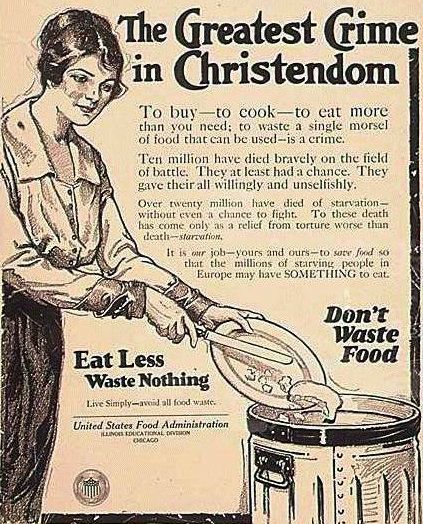dhermann1
I'll Lock Up
- Messages
- 9,154
- Location
- Da Bronx, NY, USA
Good point.
I wasn't kidding when I talked about wastefulness being a sin -- it was viewed as exactly that, a severe moral failing. Those of us who were raised to believe that can't help but find ourselves deeply at odds with modern values.
"Waste proceeds from ignorance, ingratitude and unthankfulness, from luxury and want of compassion. Man could not waste the bounties of Heaven if he considered his obligations to God or the various wants and necessities of his fellow creatures. He who wastes, forgets that he is a dependent and accountable servant and seems only willing to live for himself, to pamper his appetite, to indulge his ease, and to think no more of others. " -- Rev. William Agutter, A. M., 1796.
I wasn't kidding when I talked about wastefulness being a sin -- it was viewed as exactly that, a severe moral failing. Those of us who were raised to believe that can't help but find ourselves deeply at odds with modern values.
"Waste proceeds from ignorance, ingratitude and unthankfulness, from luxury and want of compassion. Man could not waste the bounties of Heaven if he considered his obligations to God or the various wants and necessities of his fellow creatures. He who wastes, forgets that he is a dependent and accountable servant and seems only willing to live for himself, to pamper his appetite, to indulge his ease, and to think no more of others. " -- Rev. William Agutter, A. M., 1796.
Old Bill wasn't just whistling Dixie there, folks. But nobody's listening anymore.

To me the golden era ended in the mid fifties with Elvis and the beginning of Rock & Roll. It changed America and the world forever.
I would counter that without individuals - and more than that, without a basic idea of the dignity of individuals - society is not much more than a machine for stepping on ants.Without society, the individual is just 160 pounds of compressed dust, or a lone ant separated from the nest: inconsequential, easy to ignore, easier yet to step on.
The Cult of the Individual -- the idea that the Almighty Individual stands aloof from any obligation to society -- is the most pernicious means yet devised for keeping the masses helpless and disempowered. Alone, separated, divided by trivialities like race, ethnicity, party, or sect, relying only on our own strength, we haven't got a chance. And the promoters of the C. of the I. know that.
Take a closer look at the *real* values of the thirties. Not the pseudo-Era-values strained thru the filter of the eighties, but the values that people actually fought for when they marched in Blue Eagle parades, supported sit-down strikes, and told the Liberty Leaguers and the Coughlinites where to get off in 1936. It was an era where the national slogan was "We Do Our Part," not "I've Got Mine."
Not a Randian, sorry. Her views were very much in the minority in the '30s, and I think the ascendency of them today is a sign of what's wrong with the world: an up-yours, I-got-mine sociopathy that ends up demeaning us all. I thought "The Fountainhead" was a pretty good picture, as a movie, but my taste in movie heroes runs more to Tom Joad, and in literature to Clifford Odets.